“Failure is success and success is the failure that happened to go right.”
Zachary knows a lot about dealing with life’s curveballs. At just 21, while a senior in college, he was diagnosed with pediatric brain cancer and told he had six months to live. After realizing how few resources there were for young adults diagnosed with cancer, he sought to take the bad hand he was dealt and build an organization that would meet that need.
That organization eventually became Stupid Cancer, a nonprofit dedicated to empowering young adults affected by cancer “by ending isolation and building community.” Though he defied doctors’ expectations and survived cancer, Zachary has continued to fight for patients who are facing a similar struggle.
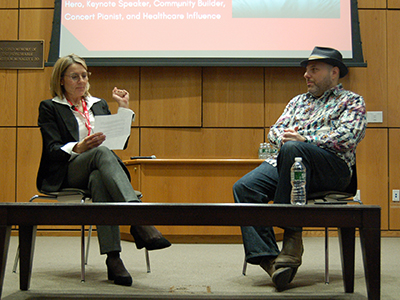
Zachary recently delivered his message about perseverance to a rapt audience of about 250 attendees at TrepCon 2020, Fordham University’s Ninth Annual Entrepreneurship Conference. The event, presented by Fordham Entrepreneurship Society and the Gabelli School of Business and sponsored by Deloitte, brought together students to talk about how to handle the highs and lows of entrepreneurship.
At the event, Zachary discussed some of Stupid Cancer’s biggest successes, including pushing for a change that allows young adults facing cancer to pause their student loan payments. Stupid Cancer, originally launched as Steps for Living in 2004, has centered on building a community for young adults who otherwise may have had to face their illness alone.
Peppered among the group’s big positive milestones were failures along the way, he said, including an ill-received app and venue change for an annual gathering of patients called Cancer Con.
“It’s hard the first time, because no one wants to be rejected,” he said in an interview at the event. “The first ‘no’ is devastating and then you’re less emotionally affected by the ‘no’s’ as they keep creeping up. Those are hard to see as opportunities in the moment, but it’s important to step back, center yourself, and have your purpose. This is going to sound like a Hallmark card, but if there’s no darkness how do you see the sun?”
Though Zachary stepped down from his role as CEO and no longer serves the group in a formal role, Stupid Cancer is still serving the young adult cancer community.
He plans to use his hard-won lessons in his next venture: the launch of OffScrip Media, a podcasting network that melds patient advocacy, education, and digital health.
“Pivot is keeping one foot on the ground and refocusing your purpose,” Zachary said. “For me, not having to run a nonprofit, but keeping true to the biggest purpose I had there, which is being a voice, a convener, is what I’m pivoting on. I have a massive global following of people who I’ve helped and believe in the greater cause. … I can take everything I’ve learned with Stupid Cancer and then be the voice of patient advocacy.”
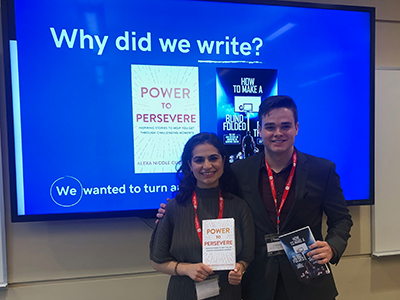
Flexibility and thinking outside of the box was a consistent theme throughout TrepCon. Michael Gelb, speaker and author of How to Think Like Leonardo da Vinci, delivered lessons on how to think like the Renaissance genius.
The first of Gelb’s seven principles was that of embracing curiosity in order to think unconventionally.
“Leonardo da Vinci was probably the most curious person who ever lived,” Gelb said. “What was he curious about? Everything, if you want to know the truth.” He used the curiosity to invent a slew of items that were far ahead of their time, Gelb said, everything from the parachute to the extendable ladder.
Want to awaken that curiosity within yourself? Remove limits from yourself and embrace your child-like inquisitiveness, Gelb said. Let your mind roam free, and allow even the most off-the-wall ideas room to flourish—while carrying around a notebook to record those thoughts for you to come back to, he recommended.
The author also touched on the responsibility that entrepreneurs have in the broader world, and how placing emphasis on the greater good can fuel success.
“I’m asking you what’s the purpose of business?” Gelb said. “Imagine a world in which the primary purpose of business is to promote human flourishing.”
That message resonated with Yang Hu, a first-year student at Gabelli, who plans to pursue a concentration in entrepreneurship.
“One of the highlights has been, for me, the principles that [Gelb] taught to become more human—with the real goals of businesses promoting human nourishing, eliminating human suffering, and creating joy for everyone in society,” Hu said.
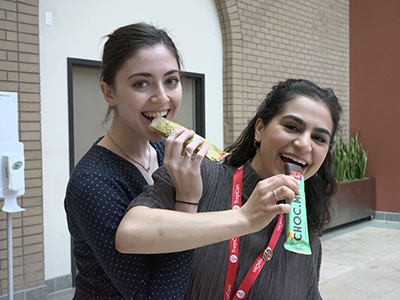
At TrepCon, attendees were able to attend breakout sessions to hone skills ranging from starting a nonprofit to starting a podcast. Guests also mingled with local entrepreneurs who showcased their own new products, including Silvr, a portable flatware that is meant to cut down on plastic utensils, and Roast Me, a party game meant for ribbing your social circle.
“I like that there are some startups that we can take a look at, it’s awesome to see business in practice,” said Isabella Sorza, GABELLI ’21, an exchange student from Colombia who is majoring in business administration.
Ultimately, the core of the event was about building community and supporting entrepreneurs along their path.
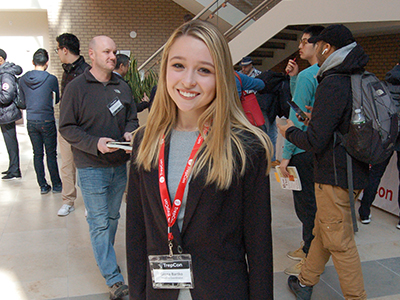
“It’s really amazing to see it all come together and to see everyone in the Fordham community interacting about entrepreneurship,” said the event’s co-chair Giana Bartko, a sophomore at Gabelli majoring in business administration with a concentration in entrepreneurship. “It’s inspiring to see what everybody has done and the resources that are available here as well as the connections that can be facilitated here.”
—Kelsey Butler
]]>After graduation, Ambrosino, a philosophy major and bioethics minor, is taking almost two years off before beginning medical school in the fall of 2019. She’ll spend part of that time interning at Cook for Your LIFE, a nonprofit that offers cooking classes and nutrition information for cancer patients and survivors.
Jeremie Langlois, FCRH ’16, has been interning in Jordan since he graduated, and is looking forward to returning to school. He and Ambrosino are among a wave of college seniors who have decided to take a gap year before continuing their graduate studies.
Ambrosino said taking time off to work in the field, with people living with life-threatening illnesses, will complement her education in a way going directly to medical school could not.
A Calling to Do More
“I think it will make me a better medical student to have that perspective. I just felt called to do more before entering,” she said. Ambrosino, whose father and aunt died of cancer, has studied at the Natural Gourmet Institute and has volunteered with Cook for Your LIFE previously, doing everything from preparing meals to ordering aprons to cleaning up food scraps.
She’s not the chef, but she’s learning cooking and knife skills and how much more there is to treating patients than just examining them and prescribing medication. “I’m learning from doctors, chefs, and nutritionists about chronic symptoms, disease management, cooking meals that are appropriate for different illness,” she said of the experience, which will include doing research at Columbia University’s Mailman School of Public Health on dietary and lifestyle interventions for breast cancer survivors.
“It’s not about curing people, but making sure that people are comfortable.” She ultimately wants to study psychiatry and plans to enter a master’s program in bioethics for a semester as well. “I really want to focus on medical ethics and nutrition together,” she said, combining her love of cooking with her desire to do something about cancer, which has touched her life in such formative ways.
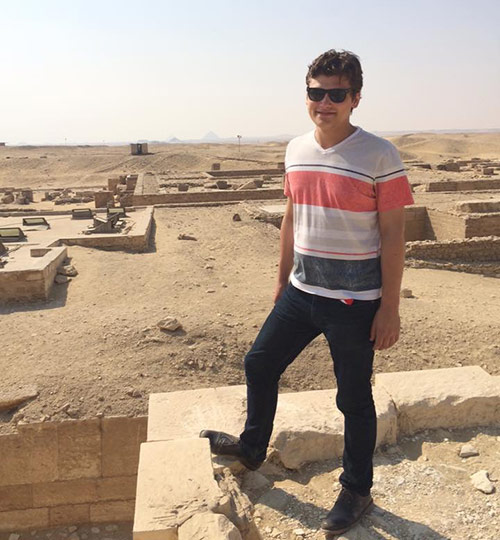
Following a Passion
Jeremie Langlois, FCRH ’16, attended high school in Cairo, and was in Egypt during the 2011 Arab Spring uprising. He said it “sparked my passion for the region.”
Since he graduated, Langlois, who grew up in a bilingual household (English and French), has spent his time interning at the Amman Center for Human Rights Studies, while also taking classes in modern standard Arabic at the Qasid Arabic Institute. He has been accepted to the University of Texas at Austin to do a double degree in law and graduate-level Middle Eastern studies, but is putting it off for a second gap year to work and prepare for the LSAT. “As someone with a broad range of interests in both the Middle East and domestic politics, the dual degree will allow me to keep my options open for future career paths,” he said. But he’s also staying open to change that may come from the remaining gap year, he said. “This process is still very much in progress.”
Students like Ambrosino and Langlois take gap years for a variety of reasons, said Jorimel Zaldivar, a counselor in the Office of Career Services.
“Usually the intention is to step outside and perhaps take a breather from the commitment to extend their education,” he said. “It may also be a time for seniors to regroup a bit, reaffirm some goals they have placed for themselves, and use this time to outline an action plan in meeting these goals.”
–Julie Bourbon
]]>“We have to flood the market to let women and young girls and boys know that they should get vaccinated,” said Meneses, Ph.D., associate professor of biological sciences, who dedicates his laboratory to studying the basic processes that establish HPV infection.
HPV and Black Women
This past month, a study published in the journal Cancer highlighted the impact of the virus, which affects 14 million Americans each year, according to the Centers for Disease Control and Prevention (CDC). Researchers found that the death rate from cervical cancer, an HPV-related cancer, is higher among black women than previously suspected. According to the study, black women were dying of cervical cancer at twice the rate of white women. Among black women over the age of 20, the rate of cervical cancer death was 10.1 deaths per 100,000 women while the rate for white women was 4.7 per 100,000 women.
One major emphasis of the Cancer study is that HPV-related cancers like cervical cancer is up to 93 percent preventable by pap smears and HPV vaccinations, according to the CDC.
“There might be something biological where some groups are more susceptible, but I think there are some groups who may also be less good at preventative medicine,” said Meneses. “Once they go to get a check-up, it’s almost too late.”
Meneses, who has spent his career examining the process of initial viral entry and trafficking to better understand HPV, said HPV vaccines are mostly marketed as antiviral vaccines when in fact they should also be viewed as anticancer vaccines.
Taking Preemptive Measures
Currently, Gardasil, Gardasil 9, and Cervarix are the only vaccines approved by the Food and Drug Administration to help prevent HPV infection. Both Gardasil and Gardasil 9 have been approved for use in men, women, girls, and children. Cervarix has been approved for use in girls and women for the prevention of HPV-caused cervical cancer.
“We need to make sure that the vaccines are hitting enough people to prevent the disease from spreading from person to person,” said Meneses. “Right now, the vaccines are being taken by approximately 40 percent of young girls, and you almost need 80 percent to ensure the protection.”
While there are preemptive measures in place to combat the disease, access to affordable health care continues to be a potential limiting factor for minority women.
“If you’re not very wealthy or don’t have good health care, you’re probably not going to get the vaccine,” he said. “And if you’re not getting the vaccine early on, you’re going to be getting an HPV infection and that’s going to already predispose you to having cervical cancer.”
Meneses said the challenge that doctors face today is getting people to understand that tactical practices such as screenings and vaccinations are the first line of defense against HPV-related cancers.
“This is one of those diseases from the perspectives of a scientist that you can almost eradicate from the world because it’s virally mediated,” he said. “You could eventually cover enough people that it doesn’t present a problem anymore, but obviously that’s in an ideal world.”
Related stories:
Professors Collaborate to Detect HPV
https://now.fordham.edu/science/fordham-professors-collaborate-to-detect-hpv/
Student Researchers Seek Cure for HPV
https://now.fordham.edu/science/video-faculty-and-student-researchers-seek-cure-for-hpv-virus/
]]>On Oct. 30, the leading minds in cancer care gathered at Fordham’s Lincoln Center campus for a roundtable discussion on improving care both for patients whose cancer is active and for patients whose cancer is in remission.
“It’s a question of measuring the value of health, and not just good healthcare,” said Falguni Sen, PhD, director of Fordham’s Global Healthcare Innovation Management Center, which co-sponsored the event. “Value,” he continued, means increasing the quality of care while keeping costs under control.
A critical component of enhancing value is to coordinate care across all aspects of a patient’s treatment, said panelist Randall F. Holcombe, MD, professor of medicine at Mt. Sinai’s Icahn School of Medicine and deputy director at the Tisch Cancer Institute.
Cancer is a complex illness, he said—it entails multiple treatments over long periods of time, and it often involves multiple treating physicians, rather than a single oncologist. In addition, patients with cancer experience a high “symptom burden,” meaning that both the cancer and its treatment have steep physical and emotional tolls on patients.
Because of cancer’s complexity, it is critical that all members of the treatment team coordinate the care they provide, Dr. Holcombe said. Doing so can have marked benefits, for instance, reducing the number of emergency room visits and unnecessary hospital admissions. Quantitatively, this means lower costs; qualitatively, it means patients spend less time in a hospital and are spared the radiation-related toxicities of excessive imaging and scans.
The roundtable also touched on the importance of continuing care for patients once their cancer is in remission. This involves not only continuing medical care, but also complementary services such as nutritional counseling, psychosocial support, and rehabilitation services for late effects of the illness.
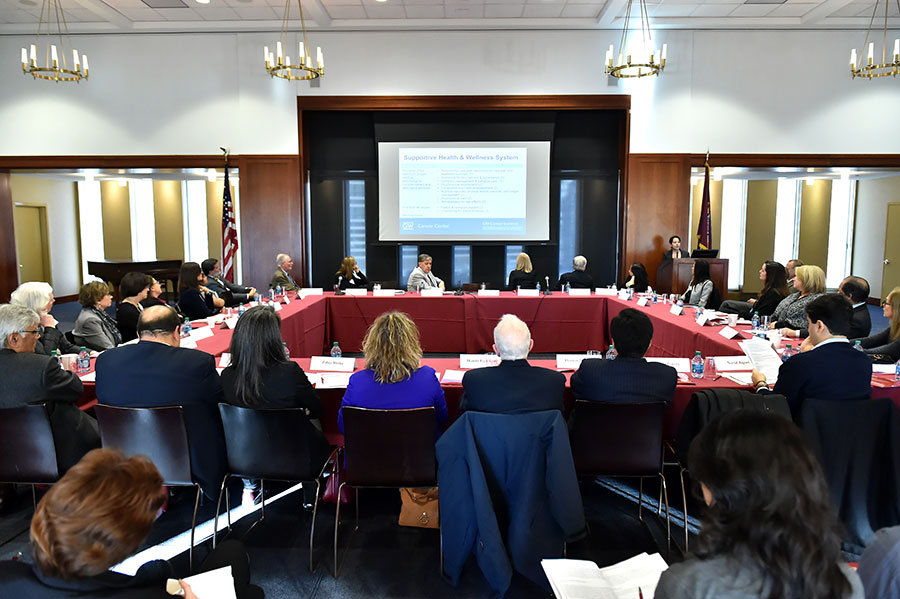
Patients may also need help grappling with the reality of having experienced a life-threatening illness and what this means going forward—a concept known as patient survivorship. Many patients embrace the term “cancer survivor” as a positive identity, while other patients are ambivalent about the term, and still others eschew it altogether.
“For many of our cancer patients, every day or every minute they’re reminded that they had cancer,” Dr. Holcombe said. “There is the constant concern that the cancer will come back, and that they’re not really ‘well.’ And they often have specific reminders of their cancer, such as neuropathies or other long-lasting toxicities.”
“One survivor told us that cancer survivorship needs to be looked at as if it is a chronic condition like diabetes, and it’s not,” said panelist Mandi Pratt-Chapman, director of the George Washington University Cancer Institute and co-PI for the American Cancer Society’s National Cancer Survivorship Resource Center. “Another told us that he had to go from the mindset of a ‘cure’ to one of ‘control,’ because he doesn’t know if he’ll ever be fully cured.
“There are some people who embrace survivorship, and others who don’t want to think about it or be reminded of the experience they had.”
The roundtable was sponsored by the Emblem Health Value Initiative, a partnership between EmblemHealth Inc. and the Global Healthcare Innovation Management Center at the Gabelli School of Business.
]]>However, it is crucial to have those conversations, said renowned oncologist and Fordham alumnus Philip A. Pizzo, MD—especially when it comes to palliative care, a specialty of medicine that can help spare patients and their families from needless suffering.
Dr. Pizzo, FCRH ’66, offered the keynote address on Oct. 20 at “Humanizing Medicine: The Achievements and Future of Palliative Care,” sponsored by the Fordham University Science Council. The event, which also featured an interdisciplinary faculty panel discussion and a presentation by Calvary Hospital President Michael J. Brescia, MD, examined the latest discussions about palliative care in America.
Palliative care refers to a type of supportive care that focuses on controlling pain and relieving symptoms for a patient, rather than actively treating an illness, Dr. Pizzo said. Many people balk at this type of care when they or their loved ones are facing a life-threatening illness, because they believe it means eliminating medical treatment altogether.
“They don’t want to give up on active medical treatment,” said Dr. Pizzo, the David and Susan Heckerman Professor of Pediatrics and of Microbiology and Immunology at Stanford University School of Medicine.
“But palliative care is not a ‘handoff.’ I shouldn’t say to a patient, ‘It’s over, there’s nothing more I can do, so I’m handing you over to palliative care’… It’s not the removal of hope, but fusing it together [with active treatment].”
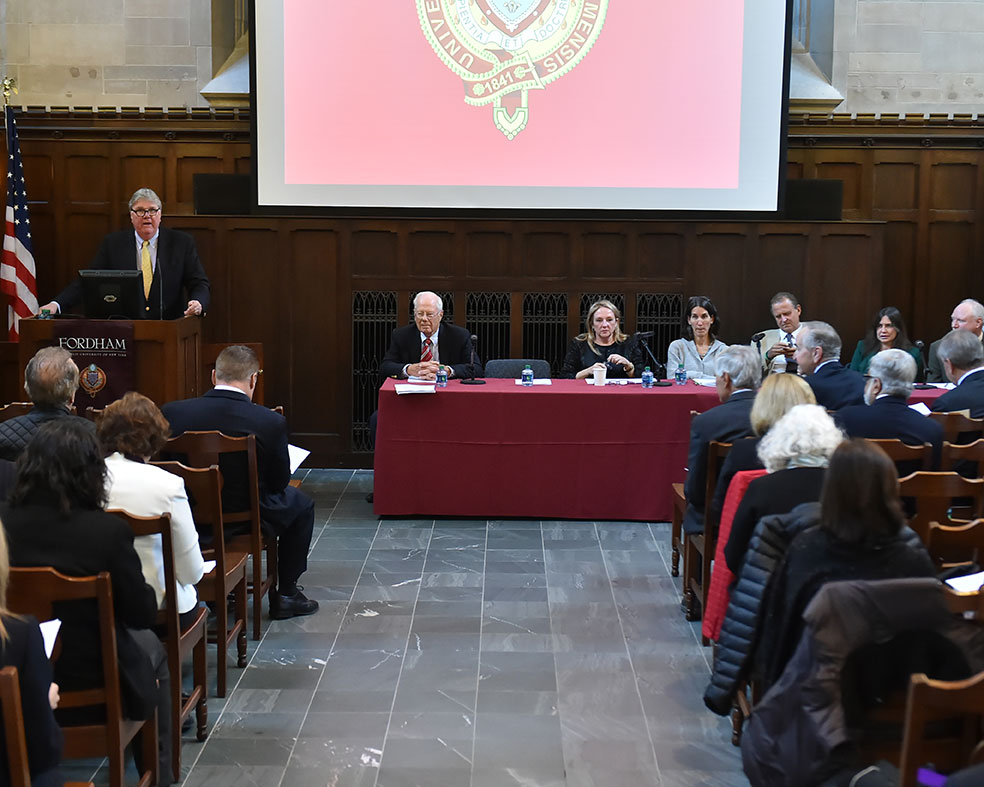
Photo by Dana Maxson
It was his Fordham education, Dr. Pizzo said, that taught him to prioritize human dignity. This humanistic approach stayed with him once he became a pediatric oncologist in the 1970s, a time when very few children survived cancer.
“I witnessed children dying with terrible pain that no medication could reverse despite our very best efforts,” he said. “I was constantly asking myself when these children were suffering: Is this appropriate? Isn’t this something we should help facilitate? Shouldn’t we help individuals to have as much dignity at the time of their death and not to suffer?”
In 2011, Dr. Pizzo co-led the groundbreaking Institute of Medicine report “Relieving Pain in America,” which included several recommendations pertaining to palliative care. One of the first recommendations was to reorganize the health care system so that high-quality end-of-life care was available and accessible to all individuals.
He cited a recent clinical trial published in the New England Journal of Medicine that studied the outcomes of adult lung cancer patients who received a combination of palliative care and active treatment. The study found that patients who received this combination of care lived on average three months longer than those patients who did not receive palliative care. (The patients were also happier, more mobile, and in less pain.)
“It’s important to not make a Faustian bargain between delivery of care and supportive care,” Dr. Pizzo said. “Every individual facing a serious prolonged illness that could lead to end of life would benefit from a palliative care physician working in tandem with their health care provider.”
The first step in these efforts, he said, is to have conversations about end-of-life care. In addition to more communication within families, the health care system needs to improve training for physicians, nurses, social workers, and other specialists so that they can better guide patients through these difficult decisions.
The event was co-sponsored by Fordham’s Global Healthcare Innovation Management Center, with support from Calvary Hospital.
]]>Alex Niles, GBA ’11, sipped a green smoothie in his neighborhood West Village cafe, happy to talk about his new normal. The young entrepreneur has a lot on his plate these days: He’s running an apparel business, writing a column for the Huffington Post, and keeping medical appointments.
It’s a very different schedule than he was maintaining just over a year ago. In 2013, Niles was “living life as any 30-year-old would”—working, traveling, and staying out late with friends. A former Division 1 college soccer player, he was a healthy, active guy. But that summer, Niles began having stomach pains. And by September of that year, he’d been diagnosed with stage 4 gastric cancer.
“You have your foundation, your routine, but then something happens and you have to hit pause,” he said.
In October he shaved his head in preparation for his 21st cycle of chemotherapy. Now he’s doing so well that his medical team said he could take an indefinite break from treatments.
“All the doctors told me I wouldn’t be here, but I’m here,” he said. “They call me Superman where I get treated.” He’s adopted a plant-based diet and a “we-got-this” attitude. Still, he stresses that there is no cure for his disease.
Living with cancer has thrown Niles into a new routine—not only as a patient but as the founder and CEO of CureWear, an apparel brand for cancer patients and their supporters.
He developed the idea for the business during his lengthy chemotherapy treatments. Each time, he’d have to remove his shirt so caregivers could access the medical port implanted in his chest to deliver the chemo drugs.
“I just didn’t want to do that. It was very belittling,” he said, and especially tough on women and little kids. He could have worn a button-down shirt, he admits. “But I was cold. It was the coldest winter ever. And I wanted to wear what I wanted to wear.
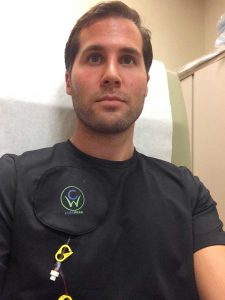
“So what I did was I literally cut a hole in my shirt and safety pinned it afterward. And I said, hold on a second. Here’s a very simple concept that actually has a very big impact on a tough situation.”
And with that, the idea for CureWear’s patient shirt was hatched. The black T-shirt features a port-accessibility patch that opens and closes with Velcro.
“It makes me feel more comfortable. My parents, my family, and friends who are there, they see me a little more comfortable. It’s even a little less awkward for the nurses,” Niles said. “When I first brought in samples to my oncology team, everyone cried, they were so happy.”
After his first rounds of treatment were successful, Niles spent the spring sourcing fabrics and working out other production details for CureWear. In August, he launched a Kickstarter campaign with a video he produced with friends on a West Village rooftop. The campaign raised $50,000, exceeding his goal by $20,000. With the contributions came several shirt orders. He has just started making his first deliveries.
Niles said he’s always had the entrepreneurial “itch,” but he sharpened his business skills at Fordham.
“[My professors] allowed me to realize my strengths as well as what I had to work harder on,” he said. “And I walked out with some really good friends.”
David Soberman, GBA ’11, who appears in the Kickstarter video, is one of Niles’ former Fordham MBA classmates. The two speak almost daily.
“I think the Kickstarter way allowed him to ease into the process,” he said. “It allowed him to take advantage of his social networks,” which Soberman said are vast. They include many loyal friends from Fordham; from Drexel University, where Niles was a scholarship soccer player; and from other walks of life.
Soberman said that throughout his treatment, Niles was always concerned about how his friends and family were handing the news of his illness and how much they were doing to support him.
To that end, CureWear also makes shirts for supporters—short-sleeve, high-quality black athletic tees with pink, blue, or green trim. They offer supporters a way to help: Niles reinvests 10 percent of the company’s proceeds in making shirts for patients, some of which he plans to give away to hospitals and other cancer organizations.

When he’s not busy running his business, Niles brings his sunny outlook to his online followers. In addition to his own blog, Smiles for Niles, he’s got a regular column with the Huffington Post and has been published in The New York Times and Psychology Today. In his Times piece, “An Athlete Tackles Cancer,” he wrote about mentally preparing for chemo treatments: “I picture myself crossing that line, snapping the ribbon of victory, and celebrating with exuberance.”
Niles said the cancer is always on his mind. “It’s a very heavy backpack to wear.”
Writing was a way to heal at first. “But it very quickly turned into what I realized was a source of strength for people. People started reaching out to me and saying thank you.” And he said the same about CureWear. “It’s been an incredibly positive distraction for me. And we’re really making an impact.
“The biggest lesson for me is that time is the most valuable commodity, and I have all intentions to make the most of mine.”
]]>
During October rehearsals of her play, The Day That Changed My Life, short, tense scenes and monologues captured the horrific moments of people discovering that they or their loved ones have cancer—a disease that kills more than half a million Americans each year.
Aldrich is not a playwright. She’s not a director or a producer. She’s an oncologist who decided long ago not to practice medicine.
“You go into it and you realize you’re limited,” she said. “You can’t stray from the regimen. I wasn’t fulfilled.”
The loss of her otherwise-healthy father to colon cancer shook the Bronx native to her core, and she grew passionate about helping others cope with the disease. She founded the nonprofit Solutions Cancer Resource Center to support families in minority neighborhoods, hoping to bridge the gulf between the physicians’ lack of time and the patients’ urgent needs.
Originally published in a series of audio books, the vignettes in the play come from patients who wrote to Aldrich via the center’s Myspace page or shared their stories in person. Aldrich tells the story of a small child with cancer of the eyes, a workaholic mom who receives her diagnosis at the office and still rushes off to her son’s soccer game, and a minister struggling to make sense of the disease’s tragic toll. “What do I say to the child that’s lost a mother or the mother that’s lost a child?” he asks, begging for God’s intervention.
Joining Aldrich in the theater’s wings were her husband, Albert Aldrich, PCS ’96, and her stepdaughter Ashley Aldrich, FCRH ’08. Dawn and Albert met at Fordham and developed a close, lasting friendship. In 2007, it led them down the aisle. A former acting student, Albert directed the production, while Ashley adapted the vignettes into a stage play.
When she’s not at the center or out in the community, Dawn Aldrich is training for her new role with the Food and Drug Administration, which appointed her to a panel tasked with reviewing new medical instruments and drugs used to treat cancer. Meanwhile, she’s hoping for some good reviews of her own for her play, a labor of love.
The Day That Changed My Life ran for three nights in October 2011 at the Manhattan Movement & Arts Center on West 60th Street.
—Nicole LaRosa

Members of the Fordham University community will do their part in the fight against cancer this Saturday, April 4.
Relay for Life, a fundraising event from which all proceeds go to the American
Cancer Society, will take place at the Robert Moses Plaza on Fordham’s Lincoln Center campus. There is still time to start a team, join a team or donate to the cause by visiting:
www.relayforlife.org/fordhammanhattan
Faculty and staff are strongly encouraged to participate as well as
all students, said Fordham College at Lincoln Center junior Peter Muller.
“We will also be celebrating cancer survivors and their caregivers, so if any
faculty, staff, or students are survivors or caregivers they should contact me,
Peter Muller, at [email protected] or Kathryn Swilling at
[email protected],” he said.
Relay for Life at Fordham takes place from 10 a.m. to 10 p.m. There will be entertainment provided by student teams all day as well as performances by student bands.
]]>
Schwall, a biological sciences major, plans to pursue biochemistry research. The majority of her fundraising has been through personal relationships, and her team’s goal this year is to raise $7,000. “Talk to everyone you can,” she said. “It never hurts to reach out to people. You never know who will say ‘yes.’”
Relay For Life is the American Cancer Society’s signature activity. Teams of people come together and have fun while raising much-needed funds for the organization, and raise awareness of cancer prevention and treatment. The 4th annual Relay For Life of Fordham University will take place on Rose Hill campus in April 2009. For more information log onto their website at www.fordhamUrelay.com.
]]>